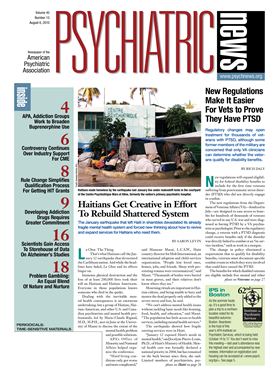A group of African-American psychiatrists who banded together in the 1960s to push for change and equality was following in the footsteps of Solomon Carter Fuller, M.D., the first black American psychiatrist, and led the way for others in the decades that followed.
Fuller challenged the status quo while maintaining his dignity in the face of disheartening racial discrimination during the first half of the 20th century, said Donna Norris, M.D., in accepting the award given in Fuller's name at APA's 2010 annual meeting in New Orleans in May.
Today's black psychiatrists must be equally determined in pressing to take their place in the profession, said Norris, a child, adolescent, and forensic psychiatrist in private practice in Wellesley, Mass. Among the positions she has held at APA are secretary/treasurer, speaker of the Assembly, Area 1 representative to the Board of Trustees, and secretary of the APPI Board of Directors.
“Despite the discrimination he encountered, Fuller never allowed or expected the bias of others to lower his professional ethics or expectations,” she said.
After graduating from medical school at Boston University in 1894, Fuller took a job at Westboro State Hospital in Massachusetts. Facing discrimination in his desire to practice psychiatry, he thought he would do better in a relatively new field, exploring the neuropathology of the brain. He traveled to Germany in 1904 to study with Emil Kraeplin, M.D., and Alois Alzheimer, M.D., at the Royal Psychiatric Hospital of the University of Munich, where he was one of only five foreign students accepted that year by Alzheimer.
His welcome in Munich was in contrast with the discrimination he met in the United States, said Norris.
Fuller's attempts to volunteer for service in World War I came to naught when he was denied equal rank and position with doctors who had similar training because he was black. However, he agreed to train other black psychiatrists for service at the Tuskegee veterans hospital, designated for black troops.
Fuller's pioneering work did not guarantee a smooth passage through the profession for African-American psychiatrists who followed, as Norris found in interviewing a number of colleagues, both black and white, in preparation for her talk.
Many were members of the “Think Tank,” an informal group organized in the 1960s by black psychiatrists for change and equality in APA and in mental health care.
At APA's 1969 meeting in Miami, for instance, Charles Pinderhughes, M.D., called on the National Institute of Mental Health to end its exclusion of blacks from positions of authority. He also condemned the absence of minority representation on APA councils and committees.
The APA Board of Trustees responded by granting one nonvoting seat on the Board for an African-American psychiatrist, a decision that would have a liberating influence on American psychiatry, said Norris.
Chester Pierce, M.D., an emeritus professor of psychiatry at Harvard, told Norris that APA could have done more during the civil rights era. “A learned society must push for change in U.S. society,” he said.
The opening of APA and American psychiatry to African Americans came only after that initial pressure, said Norris.
The appointment of Jeanne Spurlock, M.D., as a deputy medical director of APA (the first woman as well as the first African American to hold that position) was a “turning point,” former APA President Alan Stone, M.D., told Norris. Under Stone's presidency (1980), APA was involved in litigation seeking to desegregate psychiatric hospitals in the south and to improve care for African-American patients.
Overall, the black psychiatrists Norris interviewed described a wide range of experiences about the role of race in their professional lives.
“They were victims of discrimination, exclusion, and racial stereotypes,” said Norris. Black psychiatrists' initiatives for improvement often were met with resistance or undermined. “They were impeded by old-boy networks and tokenism.”
Were Fuller, who lived from 1872 to 1953, alive today, he might be pleased at advances in black civil rights but his experience with the racial politics of his era would not be irrelevant today, she said.
Programs for minority research training are being phased out, and the “black seat” on the APA Board has been empty for a year, even as health reform legislation was being debated on Capitol Hill.
“Many black and minority psychiatrists feel that APA now seems more exclusionary since restructuring has eliminated many committees,” she said.
However, Fuller would no doubt press young black physicians to continue developing the drive, the vision, and the expertise to take part in decision making about mental health care in America, especially as it affects African Americans and other minorities, Norris concluded.
“We can't quit,” Hiawatha Harris, M.D., another one of Norris' interviewees, told the audience after her talk. “We must be sure that the questions that are not usually asked are asked, and the things that are not usually done are done.”


